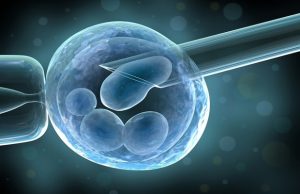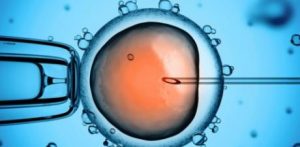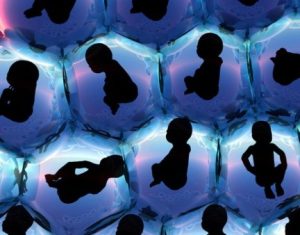Mad Scientists Genetically
Re-engineer Human Embryos!
July 21, 2015
For the first time, scientists have announced the genetic modification of human
embryos (germline modification), in a study conducted by researchers from Sun
Yat-sen University in Guangzhou, China, and published in the journal Protein &
Cell.

Previously, scientists have limited themselves to modifying the genomes of adult
cells, largely due to ethical concerns and concerns over potential side effects.
Indeed, the new paper did conclude that genome modification of embryos still
faces serious safety obstacles.
"I believe this is the first report of CRISPR/Cas9 applied to human
pre-implantation embryos and as such the study is a landmark, as well as a
cautionary tale," said stem-cell researcher George Daley of Harvard Medical
School, who was not involved in the research. "Their study should be a stern
warning to any practitioner who thinks the technology is ready for testing to
eradicate disease genes."
Shockingly high mutation rate
In order to partially allay ethical concerns, the experiment was performed on
non-viable embryos obtained from fertility clinics. These embryos could never
lead to a live birth, even if implanted.
The researchers sought to modify the gene responsible for a potentially fatal
blood disorder known as s-thalassaemia. They used a gene editing technique
called CRISPR/Cas9, which has been successfully used to modify the genomes of
adult cells in the past. The technique consists of injecting the target cells
with the CRISPR/Cas9 enzyme complex, programmed to target (remove) a specific
gene. At the same time, another molecule is injected which is programmed to
insert a new gene in place of the removed ones.
The researchers injected 86 single-celled
human embryos with
the molecules, then waited 48 hours for them to multiply into about eight cells
each. Only 71 embryos survived the process, and only 54 of these were
genetically tested. The original gene was successfully removed in only 24, and
in only a few of these did the replacement
gene take root.
"If you want to do it in normal embryos, you need to be close to 100 percent,"
lead researcher Junjiu Huang said. "That's why we stopped. We still think it's
too immature."

In addition, the process led to a surprising number of mutations, caused by
CRISPR/Cas9 targeting the wrong part of the gene. The mutation rate was much
higher than seen in mouse embryos or adult
human cells.
Huang warned that because only a small part of the genome was tested, the
mutation rate was probably even higher than reported.
Scientists call for moratorium
The paper was preceded for months by rumors, which led to a March editorial in
the journal Nature, calling for a moratorium on germline modification.
Existing gene therapies modify genes only in adult cells, and therefore are more
limited in their effects. This may restore certain functions to a damaged organ,
for instance, but is less likely to cause major changes to other types of cells
than germline
modification.
In contrast, a fertilized egg (zygote) eventually multiplies and differentiates
into every cell in the adult organism. Modifying the genome of this cell causes
changes in the organism-wide genome, and can potentially change the function of
every organ in the body. In addition, such changes are passed on to future
generations, by definition without their consent. It is also impossible to fully
understand the long-term effects these modifications could have, across the
generations.

Any germline modification, many ethicists have also warned, opens up a slippery
slope toward attempts to "improve" the human genome, such as the creation of
"designer babies." The uses of germline modification are so potentially broad,
that the risk of unethical uses is enormous.
Other germline modification studies, however, are already underway elsewhere in
China.
Related Links:
* Researchers want to genetically modify humans in supposed “cure” for obesity
* Genetically
Modified Humans? Trying to Prevent Diseases Before They Start
* UK Scientists Apply For License to Genetically Modify Human Embryos
* Lab for genetic modification of human
embryos just $2,000 away
* Scientists call for urgent debate on
‘designer babies’ as GM technology advances
* UK scientists allowed to genetically modify human embryos – regulator
Scientists are Genetically Editing Human Beings in Labs and No One is Monitoring
Them
* The World Takes 4th Major Step Towards Creating GMO Babies in a Year
* Scientists generate a new type of human stem cell that has half a genome
* New Technology, Same Old Eugenics
* Designer Babies Could Remove The Need For Sex & End Genetic Diseases
* Chinese Researchers Experiment with Making HIV-Proof Embryos
* Protection Without a Vaccine
*
Japanese scientists given green light to modify fertilized human eggs
* Will Genetic Advances Make Sex Obsolete?
*
Scientists eye creating synthetic human genomes in lab
* The Future is Now! Chinese Scientists Pioneer Human Gene Editing
*
Scientists install ‘memories’ in DNA of human cells
* Genetic Manipulation – The New Weapon Of Mass Destruction
* World’s
first ‘3-person baby’ born using ‘revolutionary’ method
* Britain agrees to license three-parent IVF babies to prevent disease
* US experts approve creation of three-parent boys – but no girls allowed
* Scientists Want to Create Babies from DNA of 4 Parents
* Breaking Taboo, Swedish Scientist Seeks To Edit DNA Of Healthy Human Embryos
* Mad scientists to fall back on “CRISPR off switch” in case human gene
editing goes horribly wrong
* DNA editing to rid embyros of serious diseases takes step closer
* Designer Babies: Genetically Modified Humans Will Soon Walk Among Us
* First human embryo editing experiment in U.S. ‘corrects’ gene for heart
condition
* Where’d you get those genes? The answer may shock you
* Scientists build DNA from scratch to alter life’s blueprint
*
Genetic engineering ‘breakthrough’ could slow aging, reverse blindness
* New tech for controlling genetic inheritance and genome engineering